Novalis - Vielleicht bist Du ein Clown (Reissue) (1978/1998)
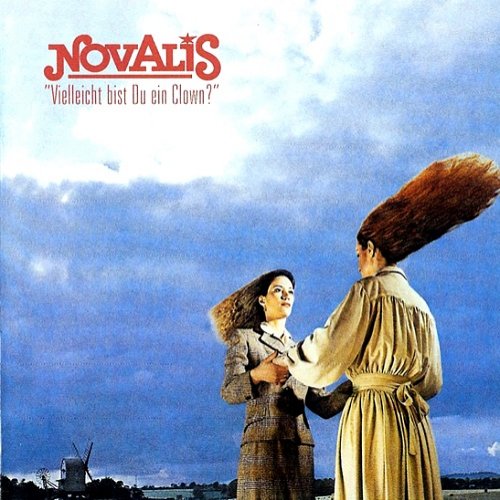
Artist: Novalis
Title: Vielleicht bist Du ein Clown
Year Of Release: 1978/1998
Label: Repertoire Records
Genre: Krautrock, Prog Rock
Quality: Flac (tracks, .cue, log) / Flac (image, .cue, 24/192)
Total Time: 34:41
Total Size: 227 Mb / 1,4 Gb (scans)
WebSite: Album Preview
Title: Vielleicht bist Du ein Clown
Year Of Release: 1978/1998
Label: Repertoire Records
Genre: Krautrock, Prog Rock
Quality: Flac (tracks, .cue, log) / Flac (image, .cue, 24/192)
Total Time: 34:41
Total Size: 227 Mb / 1,4 Gb (scans)
WebSite: Album Preview
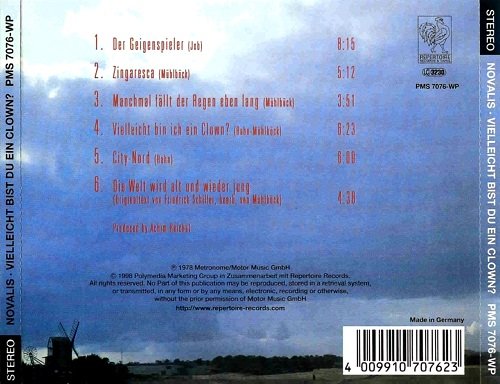
Tracklist:
1. Der Geigenspieler (8:14)
2. Zingaresca (5:12)
3. Manchmal fällt der Regen eben lang (3:50)
4. Vielleicht bin Ich ein Clown? (6:22)
5. City-Nord (6:07)
6. Die Welt wird alt und wieder jung (4:30)
Line-up:
Hartwig Biereichel / drums, kettle drum, percussion
Detlef Job / acoustic, electric & slide guitars, vocals
Fred Mühlböck / vocals, acoustic & electric guitars, flute
Lutz Rahn / Hammond H100 organ, acoustic & electric pianos, strings, Mellotron, PPG synth, clavinet
Heino Schünzel / bass, vocals
With:
Tommy Goldschmidt / percussion (1-2)
Walter Quintus / violin (1)
Formed in late 1971, the Hamburg band Novalis took their name from the nom-de-plume of the 18th Century poet Karl Friedrich Von Hardenberg, and aptly they created a rock music of poetic, lyrical and instrumental beauty. In their early days, Novalis started with a repertoire of King Crimson and Pink Floyd numbers.
A year on, and with a set of their own songs, Jochen Petersen discovered Novalis in concert, and was so impressed that he promptly got them a contract with Brain and went on to produce their debut. BANISHED BRIDGE notably showed their King Crimson influences, with Jürgen Wenzel's fragile English lyrics in a dreamy laid-back progressive rock, fleshed out with acoustic guitars and keyboards (most dominantly Mellotron). But, following a 30 day European tour (along with Jane and Emergency) organised by Brain, and also an extensive German tour, such a schedule proved too much for Jürgen, and a second album by this line-up was abandoned during recording.
So, after a year off the music scene, in early-1975, Achim Reichel rediscovered Novalis, yet by this time they were playing a very different music, with two lead guitarists, and a great wealth of synthesizers and keyboards. Via Achim's Gorilla Musik they were again signed to Brain, and to signify the change in style, the second album was left untitled. Largely instrumental, with a richly crafted instrumentation, Novalis came up with a very influential new form of progressive rock, and a song-style that many a DDR band later tried to emulate, with strongly poetic German lyrics, blending folk and classical elements into a very complexly crafted rock music. This new Novalis was even more successful than the original, yet Carlo Karges (originally with Tomorrow's Gift) didn't stay long, and for a while Novalis continued as a quartet. This slimmed-down band recorded the enigmatic SOMMERABEND which continued in a similar vein, apart from being notably spacious and classical, with synthesizers even more to the fore. Documenting this era, with the addition of Fred Mühlböck, was the ridiculously crammed-in 63 minute live KONZERTE LP from their spring 1977 tour. The same line-up, but with an even richer palette of instruments, made the majestic and all the more symphonic BRANDUNG, with an even more subtle classical and folky concoction of underlying influences, partly returning to the dreamy feel of their debut.
To make it through to the late-1970's without compromising, Novalis were certainly lucky, yet heralded by an odd Hipgnosis cover, VIELLEICHT BIST DU EIN CLOWN? although a very good album, featured a much less adventurous concoction. Moving to Achim Reichel's Ahorn label, with its motto "Rock in Deutsch", it obviously meant a music with more focus on lyrics was inevitable. FLOSSENENGEL, took on a hint more Pink Floyd influence, as well as introducing rock-ballads, and although a fine album, it was the start of the end. Admittedly Novalis went on about five years too long, yet although pampering Vertigo's whim of a new-wave angle (yes, they bizarrely appeared on Vertigo's new-wave sampler) through to the end they still retained their own identity.
Lutz Rahn also recorded a solo synthesizer album in 1978, and has continued in the music industry as a producer. Fred Mühlböck went solo after leaving the band in 1983. Hartwig Biereichel has worked in production, notably for Metronome in the late-1970's, and is now with the band Zeitlos.
A year on, and with a set of their own songs, Jochen Petersen discovered Novalis in concert, and was so impressed that he promptly got them a contract with Brain and went on to produce their debut. BANISHED BRIDGE notably showed their King Crimson influences, with Jürgen Wenzel's fragile English lyrics in a dreamy laid-back progressive rock, fleshed out with acoustic guitars and keyboards (most dominantly Mellotron). But, following a 30 day European tour (along with Jane and Emergency) organised by Brain, and also an extensive German tour, such a schedule proved too much for Jürgen, and a second album by this line-up was abandoned during recording.
So, after a year off the music scene, in early-1975, Achim Reichel rediscovered Novalis, yet by this time they were playing a very different music, with two lead guitarists, and a great wealth of synthesizers and keyboards. Via Achim's Gorilla Musik they were again signed to Brain, and to signify the change in style, the second album was left untitled. Largely instrumental, with a richly crafted instrumentation, Novalis came up with a very influential new form of progressive rock, and a song-style that many a DDR band later tried to emulate, with strongly poetic German lyrics, blending folk and classical elements into a very complexly crafted rock music. This new Novalis was even more successful than the original, yet Carlo Karges (originally with Tomorrow's Gift) didn't stay long, and for a while Novalis continued as a quartet. This slimmed-down band recorded the enigmatic SOMMERABEND which continued in a similar vein, apart from being notably spacious and classical, with synthesizers even more to the fore. Documenting this era, with the addition of Fred Mühlböck, was the ridiculously crammed-in 63 minute live KONZERTE LP from their spring 1977 tour. The same line-up, but with an even richer palette of instruments, made the majestic and all the more symphonic BRANDUNG, with an even more subtle classical and folky concoction of underlying influences, partly returning to the dreamy feel of their debut.
To make it through to the late-1970's without compromising, Novalis were certainly lucky, yet heralded by an odd Hipgnosis cover, VIELLEICHT BIST DU EIN CLOWN? although a very good album, featured a much less adventurous concoction. Moving to Achim Reichel's Ahorn label, with its motto "Rock in Deutsch", it obviously meant a music with more focus on lyrics was inevitable. FLOSSENENGEL, took on a hint more Pink Floyd influence, as well as introducing rock-ballads, and although a fine album, it was the start of the end. Admittedly Novalis went on about five years too long, yet although pampering Vertigo's whim of a new-wave angle (yes, they bizarrely appeared on Vertigo's new-wave sampler) through to the end they still retained their own identity.
Lutz Rahn also recorded a solo synthesizer album in 1978, and has continued in the music industry as a producer. Fred Mühlböck went solo after leaving the band in 1983. Hartwig Biereichel has worked in production, notably for Metronome in the late-1970's, and is now with the band Zeitlos.
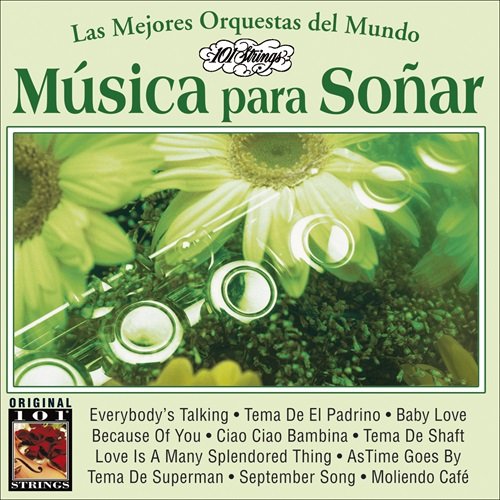
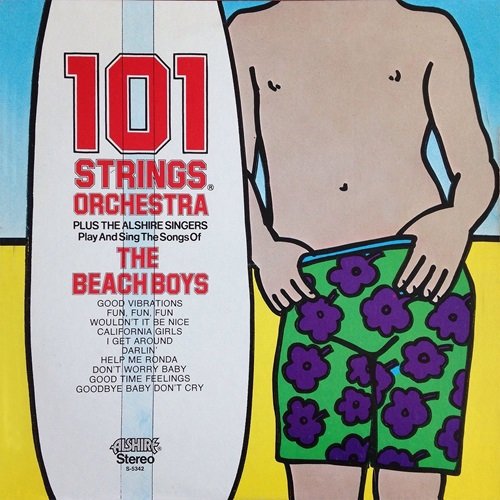

![Booker Stardrum - Close-up On The Outside (2026) [Hi-Res] Booker Stardrum - Close-up On The Outside (2026) [Hi-Res]](https://img.israbox.com/img/2026-02/26/hpg09p4i0w4yrzyjek6j087fv.jpg)
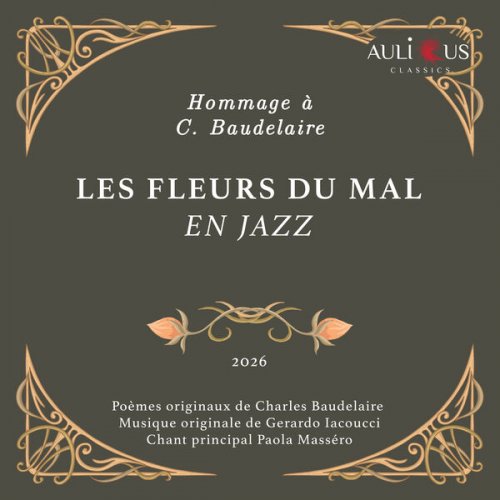
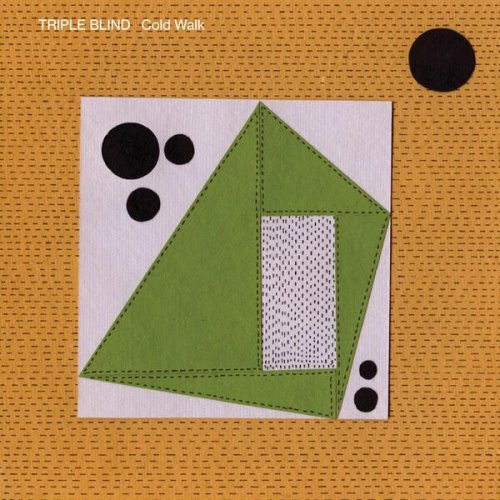
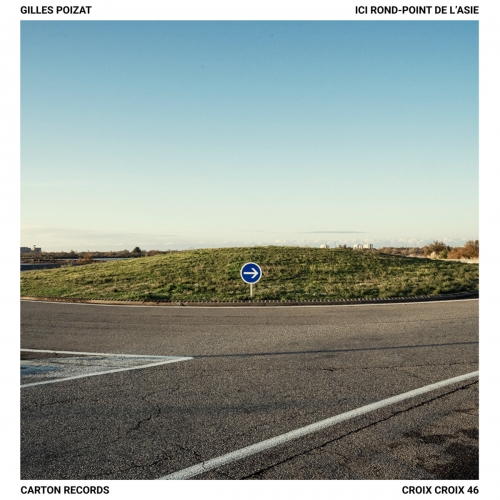
![Toshi Tsuchitori, Ryuichi Sakamoto - Disappointment–Hateruma (2026) [Hi-Res] Toshi Tsuchitori, Ryuichi Sakamoto - Disappointment–Hateruma (2026) [Hi-Res]](https://img.israbox.com/img/2026-02/27/0xnicsyi5sdb8v2xp0fiz1kew.jpg)
![Nathalie Darche, Alban Darche, Geoffroy Tamisier, Chloé Cailleton - Dandy Dandie - Helios y Selene (2026) [Hi-Res] Nathalie Darche, Alban Darche, Geoffroy Tamisier, Chloé Cailleton - Dandy Dandie - Helios y Selene (2026) [Hi-Res]](https://www.dibpic.com/uploads/posts/2026-02/1772112437_snbggfr6gccwr_600.jpg)